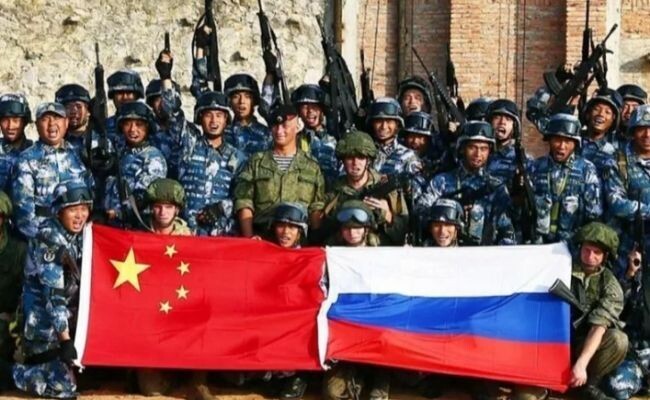Самолеты ВВС КНР прибыли на учения «Кавказ-2020»
Минитерство обороны России, сообщает http://redstar.ru/dlya-uchastiya-v-skshu-kavkaz-2020/ , что два военно-транспортных самолёта Y-20 ВВС КНР с военнослужащими НОАК прибыли в Астраханскую область для участия в стратегическом командно-штабном учении «Кавказ-2020». В составе прибывшего подразделения около 100 военнослужащих и военная техника. В ходе проведения учений планируется предеслокация войск на полигон Аданак в республику Дагестан.
В это время, как сообщает сайт «РИА Дербент», https://riaderbent.ru/v-dagestane-uzhe-zavtra-vvedut-novye-ogranicheniya-iz-za-koronavirusa.htm в Дагестане проходит заседания республиканского Оперштаба по борьбе с коронавирусом по поводу введения новых ограничительных мер для закрытия Республики в связи с ухудщением эпидемилогической ситуации в регионе. Возможно место начала учений будет изменено в ближайшее время.



7 комментариев
4 года назад
Зачем сотрудничать с китайцами, если они в открытую претендуют на Сибирь? Россиянинская элита настолько тупая?
Удалить комментарий?
Удалить Отмена4 года назад
Удалить комментарий?
Удалить Отмена4 года назад
Удалить комментарий?
Удалить Отмена4 года назад
Удалить комментарий?
Удалить Отмена4 года назад
https://www.nytimes.com/roomfordebate/2014/07/03/where-do-borders-need-to-be-redrawn/why-china-will-reclaim-siberiahttps://www.nytimes.com/roomfordebate/2014/07/03/where-do-borders-need-to-be-redrawn/why-china-will-reclaim-siberia
Why China Will Reclaim Siberia
Frank Jacobs
Frank Jacobs, the author of "Strange Maps: An Atlas of Cartographic Curiosities," blogs at Big Think.
UPDATED JANUARY 13, 2015, 11:54 AM
“A land without people for a people without land.” At the turn of the 20th century, that slogan promoted Jewish migration to Palestine. It could be recycled today, justifying a Chinese takeover of Siberia. Of course, Russia's Asian hinterland isn't really empty (and neither was Palestine). But Siberia is as resource-rich and people-poor as China is the opposite. The weight of that logic scares the Kremlin.
Moscow recently restored the Imperial Arch in the Far Eastern frontier town of Blagoveshchensk, declaring: “The earth along the Amur was, is and always will be Russian.” But Russia's title to all of the land is only about 150 years old. And the sprawl of highrises in Heihe, the Chinese boomtown on the south bank of the Amur, right across from Blagoveshchensk, casts doubt on the “always will be” part of the old czarist slogan.
Siberia – the Asian part of Russia, east of the Ural Mountains – is immense. It takes up three-quarters of Russia's land mass, the equivalent of the entire U.S. and India put together. It's hard to imagine such a vast area changing hands. But like love, a border is real only if both sides believe in it. And on both sides of the Sino-Russian border, that belief is wavering.
The border, all 2,738 miles of it, is the legacy of the Convention of Peking of 1860 and other unequal pacts between a strong, expanding Russia and a weakened China after the Second Opium War. (Other European powers similarly encroached upon China, but from the south. Hence the former British foothold in Hong Kong, for example.)
The 1.35 billion Chinese people south of the border outnumber Russia's 144 million almost 10 to 1. The discrepancy is even starker for Siberia on its own, home to barely 38 million people, and especially the border area, where only 6 million Russians face over 90 million Chinese. With intermarriage, trade and investment across that border, Siberians have realized that, for better or for worse, Beijing is a lot closer than Moscow.
The vast expanses of Siberia would provide not just room for China's huddled masses, now squeezed into the coastal half of their country by the mountains and deserts of western China. The land is already providing China, “the factory of the world,” with much of its raw materials, especially oil, gas and timber. Increasingly, Chinese-owned factories in Siberia churn out finished goods, as if the region already were a part of the Middle Kingdom's economy.
One day, China might want the globe to match the reality. In fact, Beijing could use Russia's own strategy: hand out passports to sympathizers in contested areas, then move in militarily to "protect its citizens." The Kremlin has tried that in Transnistria, Abkhazia, South Ossetia and most recently the Crimea, all formally part of other post-Soviet states, but controlled by Moscow. And if Beijing chose to take Siberia by force, the only way Moscow could stop would be using nuclear weapons.
There is another path: Under Vladimir Putin, Russia is increasingly looking east for its future – building a Eurasian Union even wider than the one inaugurated recently in Astana, the capital of Kazakhstan, a staunch Moscow ally. Perhaps two existing blocs – the Eurasian one encompassing Russia, Belarus and Kazakhstan and the Shanghai Cooperation Organization – could unite China, Russia and most of the 'stans. Putin's critics fear that this economic integration would reduce Russia, especially Siberia, to a raw materials exporter beholden to Greater China. And as the Chinese learned from the humiliation of 1860, facts on the ground can become lines on the map.
Удалить комментарий?
Удалить Отмена4 года назад
Удалить комментарий?
Удалить Отмена4 года назад
Удалить комментарий?
Удалить Отмена